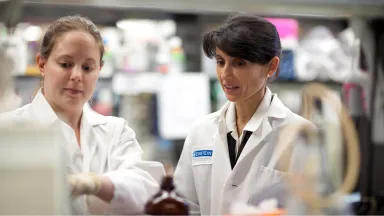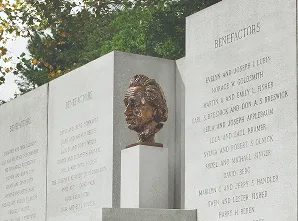
Teresa P. DiLorenzo, Ph.D.
- Professor, Department of Microbiology & Immunology
- Professor, Department of Medicine (Endocrinology)
- Diane Belfer, Cypres & Endelson Families Faculty Scholar in Diabetes Research
Area of research
- autoimmune diseases and autoantigens; immunopathogenesis of type 1 diabetes; humanized disease models; immunomodulatory therapies ,
Phone
Location
- Albert Einstein College of Medicine Jack and Pearl Resnick Campus 1300 Morris Park Avenue Forchheimer Building 403 Bronx, NY 10461
Research Profiles
Professional Interests
Type 1 diabetes is an organ-specific autoimmune disease characterized by T cell-mediated destruction of the insulin-producing beta cells of the pancreatic islets. While insulin therapy allows for continuation of life, it neither cures the disease nor prevents its devastating complications. Studies utilizing the nonobese diabetic (NOD) mouse model of the disease have shown that T cells, recognizing autoantigenic peptides bound to major histocompatibility complex (MHC) molecules, are absolutely required for disease development. T cells specific for beta cell antigens can also be detected in the peripheral blood and islets of type 1 diabetes patients. Our laboratory utilizes a combination of in vitro and in vivo models and structural biology approaches to investigate the antigenic specificities, pathogenicity, and immunobiology of T cells in type 1 diabetes. Increasingly humanized models are continually in development in our group, and these are being used to develop and optimize antigen-specific therapeutic strategies. The goals of our work are to better understand the underlying immunopathogenesis of type 1 diabetes and to develop improved tools to monitor and manipulate pathogenic beta cell-specific T cells.
Selected Publications
- Katakowski, J. A., G. Mukherjee, S. E. Wilner, K. Maier, M. T. Harrison, T. P. DiLorenzo*, M. Levy, and D. Palliser. 2016. Delivery of siRNAs to dendritic cells using DEC205-targeted lipid nanoparticles to inhibit immune responses. Mol. Ther. 24:146-155. *co-corresponding author
- Babad, J., R. Ali, J. Schloss, and T. P. DiLorenzo. 2016. An HLA-transgenic mouse model of type 1 diabetes that incorporates the reduced, but not abolished, thymic insulin expression seen in patients. J. Diabetes Res. 2016:7959060.
- Sidney, J., J. Schloss, C. Moore, M. Lindvall, A. Wriston, D. F. Hunt, J. Shabanowitz, T. P. DiLorenzo, and A. Sette. 2016. Characterization of the peptide binding specificity of the HLA class I alleles B*38:01 and B*39:06. Immunogenetics 68:231-236.
- Ali, R., J. Babad, A. Follenzi, J. A. Gebe, M. A. Brehm, G. T. Nepom, L. D. Shultz, D. L. Greiner, and T. P. DiLorenzo. 2016. Genetically modified human CD4+ T cells can be evaluated in vivo without lethal graft versus host disease. Immunology 148:339-351.
- Racine, J. J., I. Stewart, J. Ratiu, G. Christianson, E. Lowell, K. Helm, J. Allocco, R. S. Maser, Y.-G. Chen, C. M. Lutz, D. Roopenian, J. Schloss, T. P. DiLorenzo, and D. V. Serreze. 2018. Improved murine-MHC-deficient HLA-transgenic NOD-mouse models for type 1 diabetes therapy development. Diabetes 67:923-935.
- Schloss, J., R. Ali, J. J. Racine, H. D. Chapman, D. V. Serreze, and T. P. DiLorenzo. 2018. HLA-B*39:06 efficiently mediates type 1 diabetes in a mouse model incorporating reduced thymic insulin expression. J. Immunol. 200:3353-3363.
- Schloss, J., R. Ali, J. Babad, I. Guerrero-Ros, J. Pongsachai, L. He, T. Keler, and T. P. DiLorenzo. 2019. Development and characterization of a preclinical model for the evaluation of CD205-mediated antigen delivery therapeutics in type 1 diabetes. ImmunoHorizons 3:236-253.
- Purcell, A. W., S. Sechi, and T. P. DiLorenzo. 2019. The evolving landscape of autoantigen discovery and characterization in type 1 diabetes. Diabetes 68:879-886.
- James, E. A., R. Mallone, S. C. Kent, and T. P. DiLorenzo. 2020. T-cell epitopes and neo-epitopes in type 1 diabetes: a comprehensive update and reappraisal. Diabetes 69:1311-1335.
- Amdare, N., A. W. Purcell, and T. P. DiLorenzo. 2021. Non-contiguous T cell epitopes in autoimmune diabetes: from mice to men and back again. J. Biol. Chem.: 10.1016/j.jbc.2021.100827.
- Kim, S. S., A. D. Hudgins, J. Yang, Y. Zhu, Z. Tu, M. G. Rosenfeld, T. P. DiLorenzo, and Y. Suh. 2021. A comprehensive integrated post-GWAS analysis of Type 1 diabetes reveals enhancer-based immune dysregulation. PLoS One 16:e0257265.
- Gearty, S. V., F. Dundar, P. Zumbo, G. Espinosa-Carrasco, M. Shakiba, F. J. Sanchez-Rivera, N. D. Socci, P. Trivedi, S. W. Lowe, P. Lauer, N. Mohibullah, A. Viale, T. P. DiLorenzo, D. Betel, and A. Schietinger. 2021. An autoimmune stem-like CD8 T cell population drives type 1 diabetes. Nature. https://doi.org/10.1038/s41586-021-04248-x
- Amdare, N. P., L. D. Shultz, D. L. Greiner, and T. P. DiLorenzo. 2024. Human insulin as both antigen and protector in type 1 diabetes. Eur J Immunol, doi: 10.1002/eji.202350949.





